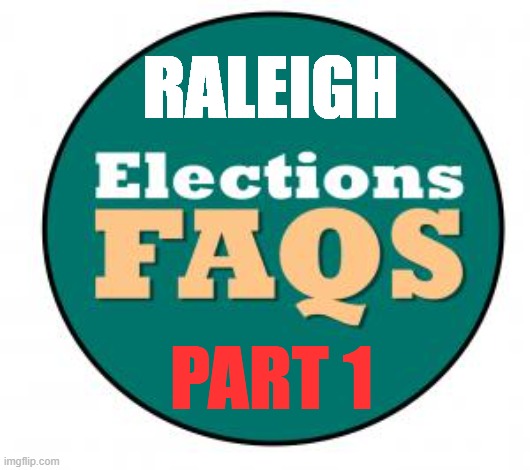We are running a 3-Part series on Raleigh’s Municipal Elections.
Today, in Part-1, we discuss when the next election will be, how it got moved, and the consequences, both pro and con, of that move.
A lot of towns in Wake County are holding general elections this Fall. When is the next general election for Raleigh’s City Council?
Without any public notice or discussion, the former City Council majority (Baldwin, Melton, Stewart, Buffkin, Branch, Forte, and Knight) plotted in secret to get the NC General Assembly to move Raleigh’s general election from October of odd years to November of even years.
Other municipalities in Wake County and NC continue to hold their municipal elections in odd years, including Angier, Apex, Cary, Carrboro, Chapel Hill, Durham, Fuquay-Varina, Garner, Holly Springs, Knightdale, Morrisville, Rolesville, Wake Forest, Wendell, and Zebulon
Why move Raleigh’s elections? What are the advantages and disadvantages?
Moving Raleigh’s elections to November of even years means we elect City Council members at the same time as other major elections are held – in some years that means during Presidential elections, US Congressional elections, NC General Assembly elections, and NC Council of State elections.
When Raleigh’s elections were held in October of odd years, turnout was very low – less than 20%. By moving the elections to coincide with more high-visibility elections, voter turnout undeniably increases. However, that can present problems for municipal candidates and for voters.
A municipal candidate will need to raise a lot more money and work a lot harder to get their messages out when they are competing against more well-financed elections like those mentioned above. It’s also harder for them to find experienced campaign managers and campaign treasurers because the larger campaigns hire them. This means we likely will have a less diverse candidate pool.
Voters will tend to pay attention to the “bigger” races and may not take the time to learn about the candidates in the “down ballot” races like City Council.
However, the biggest disadvantage to a November municipal election is that, because of November and December holidays, there is simply no time to hold runoff elections if no candidate receives more than 50% of the vote.
Because Raleigh’s municipal elections are now held in November, a candidate can win with a plurality, rather than a majority, of votes.
In the past, if a candidate did not receive 50% plus 1 vote, the next highest vote-getter could call for a runoff. That is how Charles Meeker became mayor many years ago. That is no longer possible, so if there are multiple candidates vying for the same seat, the winner could be someone with far less than 50% of the vote. That is what happened in Raleigh’s most recent election. Only Councilors Harrison and Jones had more than 50% of the vote. The Mayor and remaining councilors were elected with far less:
-
-
-
- Mayor: Baldwin – 47%
- At-Large: Forte – 46%
- At-Large: Melton – 38%
- Dist A: Black – 39%
- Dist B: Patton – 42%
- Dist C: Branch – 45%
- Dist D: Harrison – 56%
- Dist E: Jones – 51%
-
-
Livable Raleigh works hard to ensure that voters are aware of their choices in municipal elections. We publish candidate questionnaires and rate incumbents on their record. We encourage all voters to become informed about all candidates. City Council decisions about local taxes, zoning, traffic, police and firefighters, parks, and greenways directly impact your quality of life every day!
What can you do?
City Council discusses all these topics regularly, so if you subscribe to Livable Raleigh’s weekly email you will be in the know about changes they are considering.
If there is polling or a referendum on these topics, please take the time to express your opinion.
Consider contacting your City Council members to let them know how you feel.
But most of all – take the time to be an informed voter!
Livable Raleigh Editorial Team
Stay tuned for Part-2 where we’ll discuss – Plurality, Majority, Runoffs, Ranked Choice, and Primaries (partisan and non-partisan)
Read Part 2 here: Raleigh Elections – Plurality vs Majority
Read Part 3 here: Raleigh Elections – What’s the right size for Council?
If you appreciate the kind of reporting we bring to you
|
Please donate $10 or $20, Thanks for supporting |
 |

